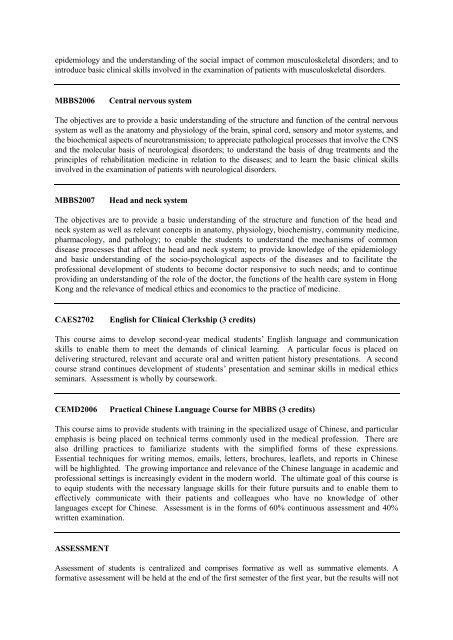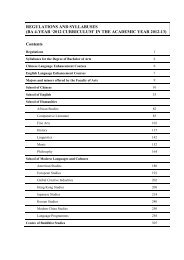(MBBS) (5-year-programme) - The University of Hong Kong
(MBBS) (5-year-programme) - The University of Hong Kong
(MBBS) (5-year-programme) - The University of Hong Kong
Create successful ePaper yourself
Turn your PDF publications into a flip-book with our unique Google optimized e-Paper software.
epidemiology and the understanding <strong>of</strong> the social impact <strong>of</strong> common musculoskeletal disorders; and tointroduce basic clinical skills involved in the examination <strong>of</strong> patients with musculoskeletal disorders.<strong>MBBS</strong>2006Central nervous system<strong>The</strong> objectives are to provide a basic understanding <strong>of</strong> the structure and function <strong>of</strong> the central nervoussystem as well as the anatomy and physiology <strong>of</strong> the brain, spinal cord, sensory and motor systems, andthe biochemical aspects <strong>of</strong> neurotransmission; to appreciate pathological processes that involve the CNSand the molecular basis <strong>of</strong> neurological disorders; to understand the basis <strong>of</strong> drug treatments and theprinciples <strong>of</strong> rehabilitation medicine in relation to the diseases; and to learn the basic clinical skillsinvolved in the examination <strong>of</strong> patients with neurological disorders.<strong>MBBS</strong>2007Head and neck system<strong>The</strong> objectives are to provide a basic understanding <strong>of</strong> the structure and function <strong>of</strong> the head andneck system as well as relevant concepts in anatomy, physiology, biochemistry, community medicine,pharmacology, and pathology; to enable the students to understand the mechanisms <strong>of</strong> commondisease processes that affect the head and neck system; to provide knowledge <strong>of</strong> the epidemiologyand basic understanding <strong>of</strong> the socio-psychological aspects <strong>of</strong> the diseases and to facilitate thepr<strong>of</strong>essional development <strong>of</strong> students to become doctor responsive to such needs; and to continueproviding an understanding <strong>of</strong> the role <strong>of</strong> the doctor, the functions <strong>of</strong> the health care system in <strong>Hong</strong><strong>Kong</strong> and the relevance <strong>of</strong> medical ethics and economics to the practice <strong>of</strong> medicine.CAES2702English for Clinical Clerkship (3 credits)This course aims to develop second-<strong>year</strong> medical students’ English language and communicationskills to enable them to meet the demands <strong>of</strong> clinical learning. A particular focus is placed ondelivering structured, relevant and accurate oral and written patient history presentations. A secondcourse strand continues development <strong>of</strong> students’ presentation and seminar skills in medical ethicsseminars. Assessment is wholly by coursework.CEMD2006Practical Chinese Language Course for <strong>MBBS</strong> (3 credits)This course aims to provide students with training in the specialized usage <strong>of</strong> Chinese, and particularemphasis is being placed on technical terms commonly used in the medical pr<strong>of</strong>ession. <strong>The</strong>re arealso drilling practices to familiarize students with the simplified forms <strong>of</strong> these expressions.Essential techniques for writing memos, emails, letters, brochures, leaflets, and reports in Chinesewill be highlighted. <strong>The</strong> growing importance and relevance <strong>of</strong> the Chinese language in academic andpr<strong>of</strong>essional settings is increasingly evident in the modern world. <strong>The</strong> ultimate goal <strong>of</strong> this course isto equip students with the necessary language skills for their future pursuits and to enable them toeffectively communicate with their patients and colleagues who have no knowledge <strong>of</strong> otherlanguages except for Chinese. Assessment is in the forms <strong>of</strong> 60% continuous assessment and 40%written examination.ASSESSMENTAssessment <strong>of</strong> students is centralized and comprises formative as well as summative elements. Aformative assessment will be held at the end <strong>of</strong> the first semester <strong>of</strong> the first <strong>year</strong>, but the results will not
















